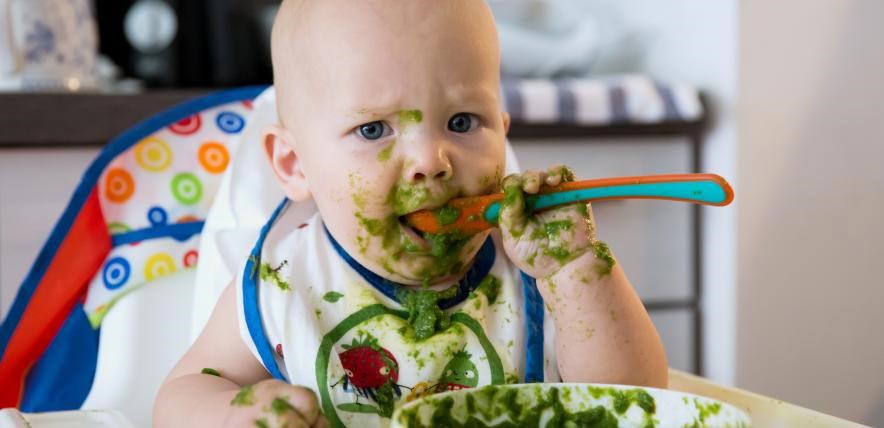Do you ever find yourself sitting at the dinner table trying to get your picky eater to try a new food and then wonder why your child has become the picky eater that you are seeing before you?
You may have had a baby that would eat anything and now your toddler is staring at you and saying NO to you and refuses to eat anything. This is not uncommon for a child when he is in the pre-toddler or toddler stage. Fussy eating simply arrives with your child’s realization of his or her own individuality.
As children become more aware of the world around them, they become picky eaters. They would rather have sweet foods such as ice cream over those brussel sprouts that you are trying to get them to eat. Wouldn’t you? A child will prefer a fatty food such as ice cream because it has a smooth texture to it and feels good on their tongue, rather than a brussel sprout that tastes bitter to them. That’s just common sense.
Read on to find 7 reasons why toddlers refuse to eat:
-
One Bite Rule
The ‘at least one bite’ rule sets up a power struggle between parent and child. More often than not, the ‘at least one bite’ includes a bribe. “You can have dessert (something sweet) if you eat one bite.” The number of tries, threats, bribery, and begging all set up a power struggle between parent and child. In the long-term, both parent and child, lose.
 The parent loses because the child learns they are in control and can extract a price or leverage something by eating. The child loses because they learn manipulative behavior and controlling vs the parent(s) being in charge of managing a healthy food plan and healthy interactions. In the long-term the child also loses because it sets up a life-long internal battle with food.
The parent loses because the child learns they are in control and can extract a price or leverage something by eating. The child loses because they learn manipulative behavior and controlling vs the parent(s) being in charge of managing a healthy food plan and healthy interactions. In the long-term the child also loses because it sets up a life-long internal battle with food. -
Disguising Food
Disguising food also sets up a power struggle in a different way–the child usually suspects the deception at the out-set and will more often than not refuse to eat it. When the child asks, “Is this ___?,” the parent is faced with a dilemma. “Do I tell the truth or lie for a greater good?”-enticing my child to eat what I think they need to eat.
A child will sooner than later discover what has been done. This form of dishonesty with the child is a betrayal of trust and the parent(s) loses integrity with their child. The question is: Is disguising the food in a foolhardy attempt the main reason why toddlers refuse to eat what they don’t want to eat worth compromising your integrity and betraying their trust?
-
Not the right taste
Toddlers tend to have sensitive taste buds. If the food prepared is too spicy or bland, they will refuse to eat it outright. The key here is to get the combination right and induce your child with the correct taste. Observe and decide your child’s preferred taste.
-
Too much discipline
It is natural for a toddler to mess at dinner time. If you lecture him excessively for his messy eating habits, he is likely to develop a negative attitude towards eating. Instead, encourage your child to enjoy his meal by scolding him less and inculcating the apt table etiquette. You can also cover the dining table with plastic covers to lessen the mess created.
-
Junk food
If your toddler has easy access to junk food at all times, he will not be hungry during normal meal times. The solution is to limit children’s access to junk food and only allow it during snack times. Have a check on his pocket money to control the purchase of junk food. It can include sweets, chips, chocolates, etc. As an alternative to junk food in snacks, offer them fresh fruits with ice cream, yogurts, almonds, fresh fruit shake, etc.
-
Dining Out
Dining out occasionally is fine, but frequent outdoor meals are bad for your kid’s meal habits. No matter how healthy the food available outside is advertised to be, nothing can beat home cooked food. Your child will get addicted to outside food, which is not good for his health. Restaurants and food places tend to tempt children with ready-made mouth-watering food options. If your child consumes such food repeatedly, he may fail to appreciate the taste of healthier home cooked alternatives.
-
Pickiness
Parents assume that they know everything about which food is good for their kids. Young kids like to experiment with different varieties of food. Poor eating remedies for children can be introduced by encouraging them, offering them various healthy choices to indulge in and relish.

So, here are few strategies that will create the environment to support your toddler to do what they deem scary- try new foods:
-
Influence
We are all influenced by what we see on television. Advertisers know how to influence children and they use animated characters in television advertisements to appeal to children. Your baby giggles at an animated monkey; your toddler wants ice cream because a cartoon duck is eating an ice cream cone. Advertisers know this.
Everywhere you turn, there’s a cartoon character trying to sell to your child. Knowing this, when you are trying to encourage and tempt your picky eater, it certainly would not hurt if you can somehow incorporate animated characters into the process – you are probably wondering how you can do that.
-
Limit Junk Foods
One major reason why toddlers stop eating healthy foods is because they have developed a strong preference for more flavorful (but unhealthy) junk foods. Do not introduce candies and sweets and salty chips to toddlers. Make sure that you check the menus of your babysitter or day care center to see if the foods being served are high in salt, sugar, and fats.
-
Be Able to Differentiate between Boredom and Hunger
Parents often have the problem of distinguishing between genuine hunger from boredom in a cranky toddler. A cranky toddler who is bored would want to play or be given an activity that would keep him or her occupied. If a toddler is hungry, give light but healthy snacks like fruits slices or veggie sticks. Make sure that you also offer him plenty of water in between meals. If your toddler is really hungry, consider feeding him or her the next meal a few minutes earlier.

-
Stick with Your Meal Plan
Moms should have not an alternate meal plan for a toddler. Encourage him or her to eat the meals that have been set on the table. It is okay not to give them an alternate food and let them skip a meal. In this way, you will impress upon your toddler that they will have to eat what has been served or else they will have to wait for snacktime or the next mealtime to be able to eat.
-
Be a Good Example for Your Toddler
Toddlers develop healthy eating habits by mimicking their parents. They are more likely to eat new, healthy food choices if they see their Moms and Dads eating them. Also, toddlers who are hungry are more inclined to try out new foods. It is also important to impress upon your child to eat foods that they can consume. Do not insist that they finish every morsel on their plate, especially if they say that they are already full.
[su_note note_color=”#efefef”]See also: 5 Tips to make cooking with your toddler fun[/su_note]
